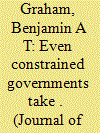| Srl | Item |
| 1 |
ID:
161599


|
|
|
|
|
| Summary/Abstract |
This article analyzes an understudied and contested form of government taking, transfer restriction, which has supplanted expropriation as the most ubiquitous and costly type of international property rights violation. Veto-player-type constraints curtail governments’ ability to engage in outright and (nontransfer related) creeping expropriation but have little impact on their ability to generate wealth via transfer restrictions. We use a formal model to derive testable implications regarding the effect of political institutions and domestic politics on governments’ ability to collect these two types of rent. Empirically, we use novel time-series cross-sectional data to show that while veto-player-type political constraints diminish expropriation risk, transfer risk is much less affected: even constrained governments impose transfer restrictions.
|
|
|
|
|
|
|
|
|
|
|
|
|
|
|
|
| 2 |
ID:
156698


|
|
|
|
|
| Summary/Abstract |
Democracy is often fragile, especially in states recovering from civil conflict. To protect emerging democracies, many scholars and practitioners recommend political powersharing institutions, which aim to safeguard minority group interests. Yet there is little empirical research on whether powersharing promotes democratic survival, and some concern that it limits electoral accountability. To fill this gap, we differentiate between inclusive, dispersive, and constraining powersharing institutions and analyze their effects on democratic survival from 1975 to 2015 using a global dataset. We find sharp distinctions across types of powersharing and political context. Inclusive powersharing, such as ethnic quotas, promotes democratic survival only in post-conflict settings. In contrast, dispersive institutions such as federalism tend to destabilize post-conflict democracies. Only constraining powersharing consistently facilitates democratic survival regardless of recent conflict. Institution-builders and international organizations should therefore prioritize institutions that constrain leaders, including independent judiciaries, civilian control of the armed forces, and constitutional protections of individual and group rights.
|
|
|
|
|
|
|
|
|
|
|
|
|
|
|
|